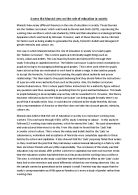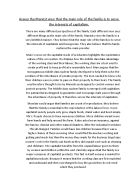Assess the Marxist view on the role of education in society
Assess the Marxist view on the role of education in society
Marxists have many different theories on the role of education in society. These theories are the ‘hidden curriculum’ which was found by Bowles and Gintis (1970), reproducing the working class workforce which was studied by Willis and that education is a Ideological State Apparatus which was found by Athusser. However, each of these theories can be criticised for factors such as being unable to generalise the study, feminist’s beliefs and disregard of gender ethnicity and culture, etc.
One way in which Marxists believe the role of education in society is to teach pupils the ‘hidden curriculum’. This is where pupils are informally taught things such as norms, values and beliefs. This was found by Bowles and Gintis (1970) through their study ‘Schooling in capitalist America’. The hidden curriculum is said to teach motivation to pupils by trying to encouraging achieving good grades. This is then used when the pupils leave school as they are motivated to work hard to attain a wage. It also teaches people to accept the hierarchy. It does this by teaching the pupils about authority and power relationships. This then leads to the pupils believing that they should follow the instructions of a person with more authority them such as the police. Also, the hidden curriculum teaches Subservience. This is where pupils follow instructions for a authority figure without any questions and then rewarding or punishing them for good and bad behaviour. This leads to pupils behaving in an acceptable way as they will be rewarded for it. However, this theory has been criticised as due to the ‘hidden curriculum’ not being taught formally there is no proof that it actually exists. Also, it could also be criticised as the study that they did was only a representation of America so therefore does not take into account gender, ethnicity, culture, etc.








